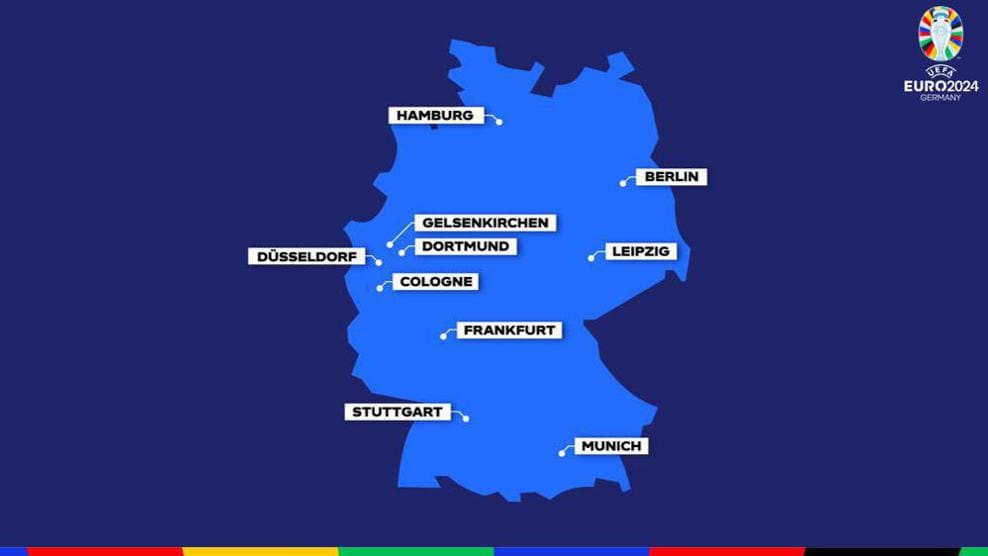EURO 2024 Final: Germany’s Host Journey and Tournament Recap
Germany took center stage as the host of the Final Euro Cup 2024, officially the 17th edition of the UEFA European Championship. The UEFA Executive Committee’s decision in Nyon on September 27, 2018, awarded the tournament to Germany, choosing their bid over Turkey’s. This marked a historic occasion as it was the first time unified Germany hosted the EURO, although West Germany had previously hosted the 1988 edition. Germany’s strong football heritage also includes hosting the 2006 FIFA World Cup.
The excitement of the Final EURO Cup 2024 unfolded from June 14th to July 14th, 2024, captivating football fans across the globe. The group stage concluded on June 26th, setting the stage for the knockout rounds which commenced on June 29th. As the host nation, Germany was positioned in Group A, taking the A1 spot, and played the opening match on Friday, June 14th at the Munich Football Arena, triumphing over Scotland with a 5-1 victory. Germany’s national team, including its history as West Germany, boasts a consistent presence at every EURO since 1972, with championship titles in 1972 and 1980 as West Germany, and a further victory at EURO ’96 as a unified Germany.
The draw for the final tournament groups took place in Hamburg on Saturday, December 2, 2023, outlining the path for each nation.
Group A: Germany, Scotland, Hungary, Switzerland
Group B: Spain, Croatia, Italy, Albania
Group C: Slovenia, Denmark, Serbia, England
Group D: Poland, Netherlands, Austria, France
Group E: Belgium, Slovakia, Romania, Ukraine
Group F: Türkiye, Georgia*, Portugal, Czechia
*Qualified via play-offs
The tournament format mirrored the successful structure of UEFA EURO 2020. The top two teams from each of the six groups, along with the four best third-placed teams, advanced to the round of 16, ensuring a thrilling knockout phase in the Final EURO Cup 2024.
Berlin’s iconic Olympiastadion was selected to host the Final EURO Cup 2024 final on Sunday, July 14th, 2024. In a thrilling match, Spain emerged victorious, defeating England 2-1 and securing their place as the first team to win four EURO titles, marking a historic conclusion to the tournament.
Ten distinguished cities across Germany were chosen as host venues for the Final EURO Cup 2024. These venues included nine stadiums previously utilized for the 2006 World Cup, supplemented by the state-of-the-art Düsseldorf Arena. Notably, the Munich Football Arena had the unique distinction of hosting matches for the second consecutive EURO tournament, having been among the eleven stadiums for UEFA EURO 2020.
EURO 2024: Host Cities
The host venues were:
Berlin: Olympiastadion Berlin (Capacity: 71,000)
Cologne: Cologne Stadium (Capacity: 43,000)
Dortmund: BVB Stadion Dortmund (Capacity: 62,000)
Dusseldorf: Düsseldorf Arena (Capacity: 47,000)
Frankfurt: Frankfurt Arena (Capacity: 47,000)
Gelsenkirchen: Arena AufSchalke (Capacity: 50,000)
Hamburg: Volksparkstadion Hamburg (Capacity: 49,000)
Leipzig: Leipzig Stadium (Capacity: 40,000)
Munich: Munich Football Arena (Capacity: 66,000)
Stuttgart: Stuttgart Arena (Capacity: 51,000)
Reflecting a growing global emphasis on sustainability in sports, the Final EURO Cup 2024 prioritized environmental and social responsibility. UEFA implemented a comprehensive Environmental, Social and Governance (ESG) strategy to ensure the tournament set a benchmark for future sporting events. Detailed information on the sustainability initiatives can be found here.
To enhance the fan experience, each host city established dedicated fan zones equipped with large public viewing screens. These zones became vibrant hubs for supporters to gather, celebrate, and enjoy the Final EURO Cup 2024 atmosphere.
The official match ball for the Final EURO Cup 2024, named FUSSBALLLIEBE, meaning “love of football” in German, was a technological innovation. Unveiled by UEFA and Adidas in November 2023 in Berlin, it incorporated Adidas Connected Ball Technology for the first time in a EURO tournament, enhancing match analysis and refereeing accuracy.
Albärt, a charming teddy bear, was selected as the official mascot for the Final EURO Cup 2024. Chosen through a vote involving UEFA.com users and schoolchildren across Europe as part of the UEFA Football in Schools program, Albärt secured 32% of the votes. He was introduced to German fans in Gelsenkirchen in June 2023, prior to a friendly match between Germany and Colombia, becoming a beloved symbol of the tournament.
Each host city for the Final EURO Cup 2024 appointed city ambassadors, prominent figures from sports and culture, to represent and promote their city’s involvement in the tournament:
Berlin: Kevin-Prince Boateng
Cologne: Harald Schumacher
Dortmund: Roman Weidenfeller, Annike Krahn
Düsseldorf: Martina Voss-Tecklenburg, Sandra Mikolaschek, Selin Oruz
Frankfurt: Alex Meier, Deborah Levi
Gelsenkirchen: Gerald Asamoah
Hamburg: Patrick Esume
Leipzig: Professor Dr Jörg Junhold, Anja Mittag, Jürgen Zielinski
Munich: Dr Felix Brych
Stuttgart: Cacau, Niko Kappel, Eli Seitz
The volunteer program for the Final EURO Cup 2024 saw an overwhelming response, with over 146,000 applications received. From this vast pool, 16,000 volunteers from 124 countries were selected to support the tournament. These volunteers played a crucial role in Germany’s ten host cities, embodying the tournament’s motto ‘United by football. Vereint im Herzen Europas.’ and ensuring a welcoming atmosphere for international guests.
“FIRE,” the official song of the Final EURO Cup 2024, was a collaboration between Italian producers Meduza, American pop-rock band OneRepublic, and German singer-songwriter Leony. Released across all streaming platforms, the song, penned by Ryan Tedder of OneRepublic and produced by Meduza, blended anthemic house, compelling pop-rock, and pop expertise, capturing the passionate spirit of football and music fans alike.
UEFA eEURO 2024, the esports counterpart to the Final EURO Cup 2024, commenced with online qualifiers in March 2024 and culminated in a final in Germany during the summer. EA SPORTS FC™ 24 served as the official platform for the eEURO 2024 competition, bridging the gap between virtual and real-world football.

